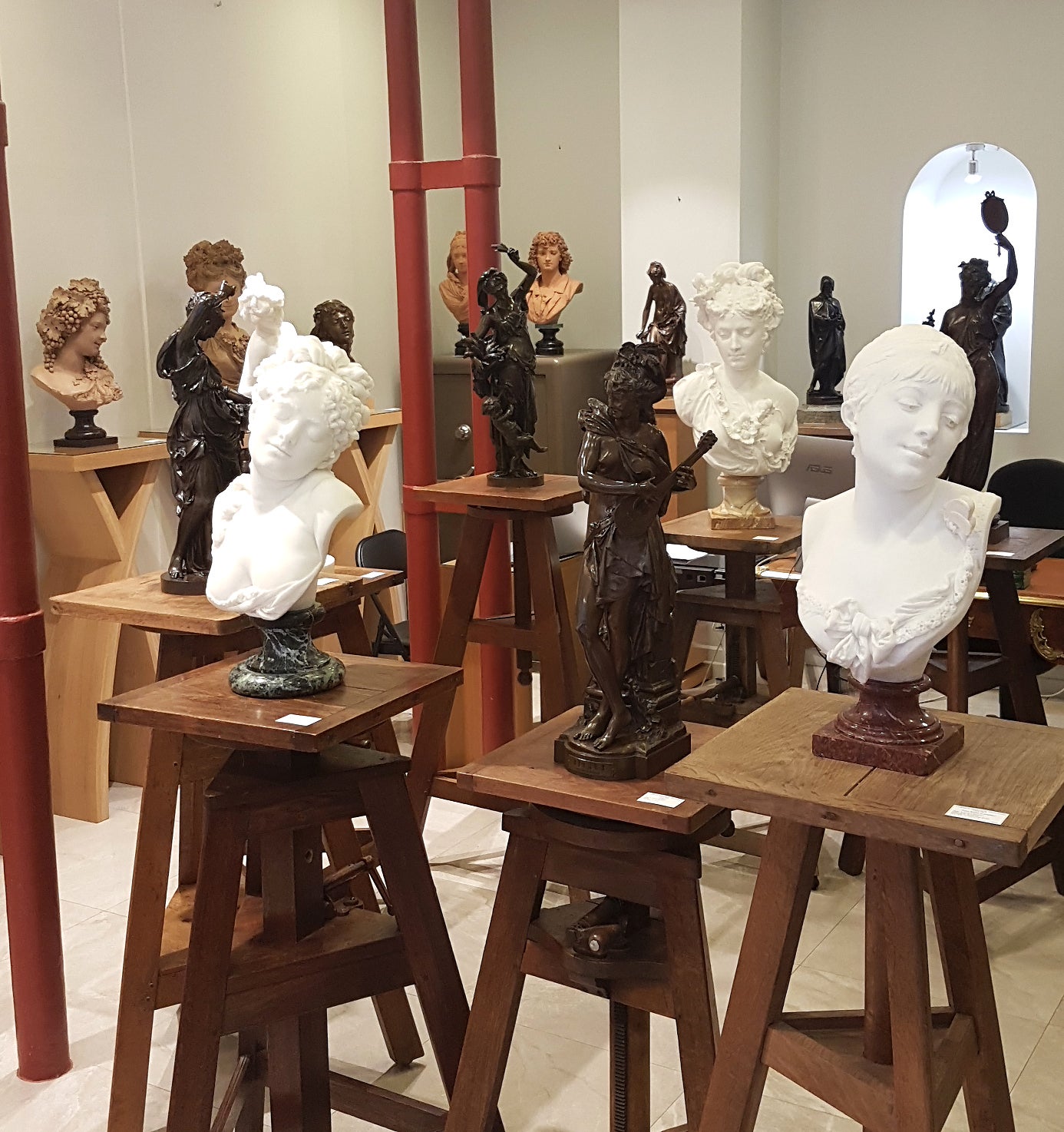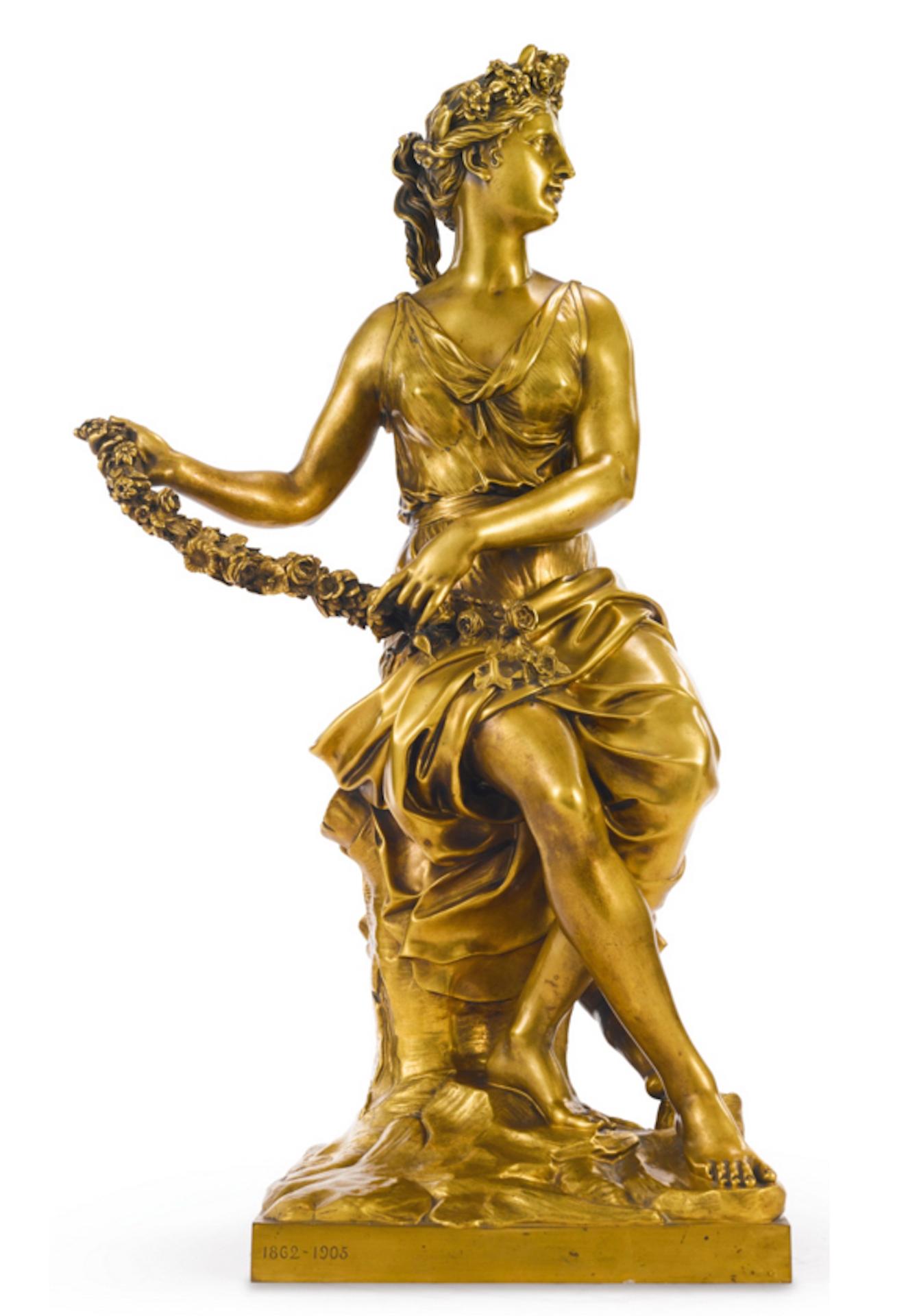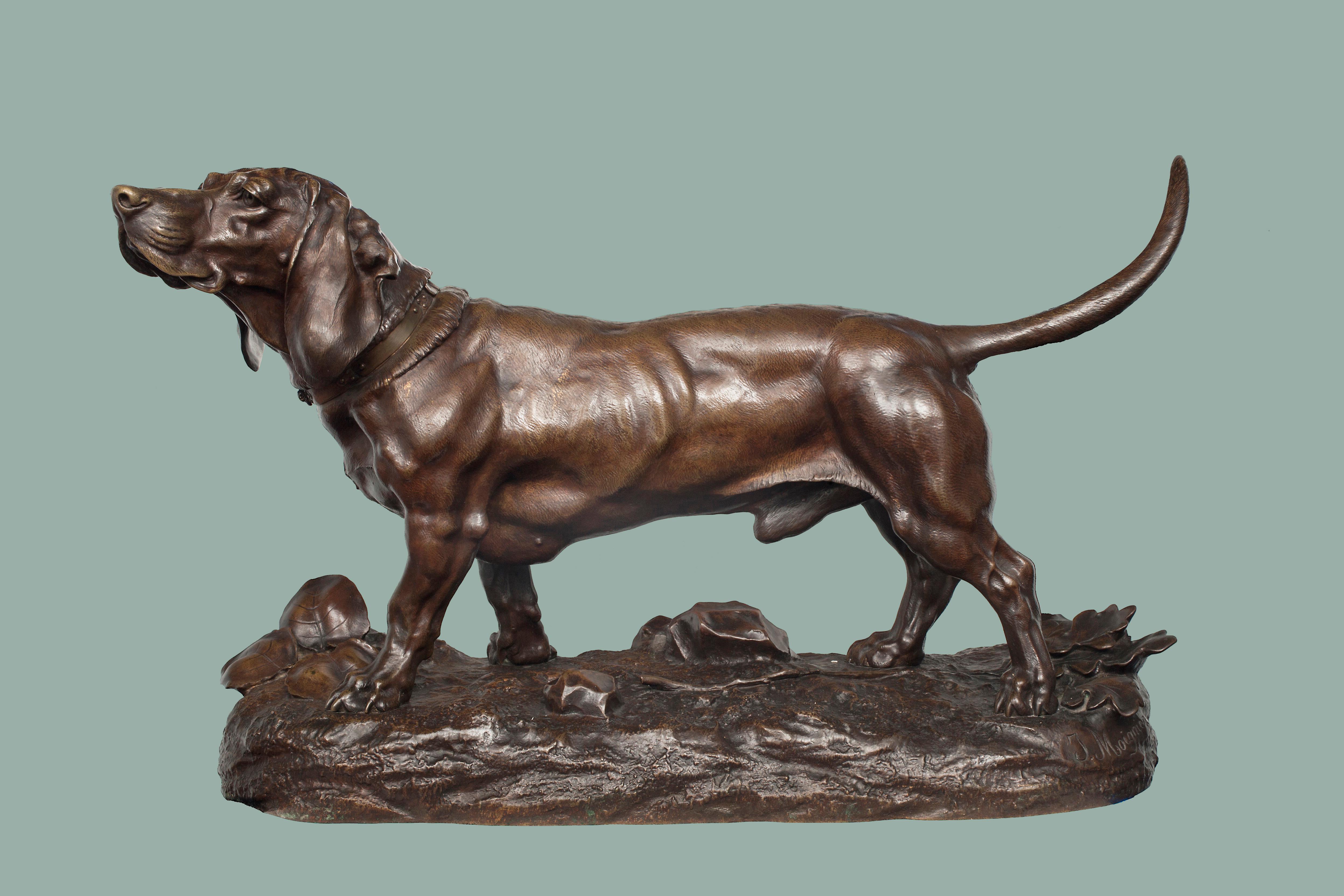Want more images or videos?
Request additional images or videos from the seller
1 of 16
Emmanuel FremietRoman driver on his chariotcirca 1880
circa 1880
About the Item
Equestrian sculpture
"Roman driver on his chariot" by Emmanuel Fremiet (1824-1910)
Bronze with its original nuanced dark brown patina
cast by MORE
France
circa 1880
height 41,5 cm
length 35 cm
Biography :
Emmanuel Fremiet (1824-1910) was the nephew and pupil of sculptor François Rude. Alongside his monumental works commissioned by the state, he was recognized as an excellent realistic animal sculptor. Emmanuel Fremiet devoted mainly to equestrian statues. He started as a scientific lithographer (osteology) and worked in the studio of painters from the morgue. In 1843 he sent to the Salon a "Gazelle" study preluding a prolific output. His "wounded Bear" and "injured Dog" acquired by the State for the Musée du Luxembourg in Paris in 1850. During the 1850s, Fremiet produced works on the theme of Napoleon III. He exposed bronzes representing bassets of Napoleon III, "Ravageot and Ravagode" at the Salon of 1853. From 1855 to 1859, he performed a series of military subject statuettes for the emperor. He realized the Napoleon Monument in 1868 and the one of Louis of Orleans in 1869 (Château de Pierrefonds). In 1874, Emmanuel Fremiet designed the first equestrian monument of Joan of Arc, erected on the Pyramids square in Paris, replaced with another version in 1900. During this period, he also performed "Pan and cubs" (Paris, Musée d'Orsay).
At the end of the nineteenth century, Fremiet was inspired by a new theme : the confrontation between man and beast. The news reported by the newspaper The Times that in 1880, in a Gabonese village, a bewildered and angry gorilla allegedly abducted and molested a woman, after having destroyed shacks. Moreover, the stories of explorers like Alfred Russel Wallace made articles and engravings for the newspapers, illustrating the attack of a Malaysian tracker by an orangutan. This theme inspired Fremiet several major works. "The Gorilla kidnapping a black woman" was initially refused by the jury of the Salon of 1859 and then presented behind a curtain. Another version received a medal of honor at the Salon of the Society of French Artists in 1887. This work, famous in his time, however rose a scandal because of it subject : it represented a gorilla kidnapping a naked woman, allegedly with a intent to rape her, what excited public curiosity. In the same vein, and even more remarkable was the "Orangutan strangling a wild Borneo" (1895), commissioned by the National Museum of Natural History in Paris, inspired by the stories of Wallace reported with many exaggerations by The Times. This time the animal is a male, and throttling the "wild man", he performs an act as impossible, physically and ethologically that the rape of a woman by a gorilla. But art works, and generations of visitors of the Museum where it was exposed, were horrified by the force emanating from the work.
In 1893, the Fremiet made the Velázquez Monument for the garden of the Colonnade of the Louvre Palace in Paris, and then in 1897, the statue of St. Michael slaying the dragon for the abbey of Mont Saint-Michel. Fremiet was elected member of the Academy of Fine Arts in 1892 and succeeded Antoine-Louis Barye as a teacher for Animal Drawing at the National Museum of Natural History in Paris. He was a member of the French Artists Society until 1908.
- Creator:Emmanuel Fremiet (1824-1910, French)
- Creation Year:circa 1880
- Dimensions:Height: 16.34 in (41.5 cm)Width: 13.78 in (35 cm)
- Medium:
- Movement & Style:
- Period:
- Condition:
- Gallery Location:PARIS, FR
- Reference Number:

About the Seller
5.0
Vetted Seller
These experienced sellers undergo a comprehensive evaluation by our team of in-house experts.
Established in 1992
1stDibs seller since 2023
Typical response time: 1 to 2 days
- ShippingRetrieving quote...Ships From: PARIS, France
- Return PolicyA return for this item may be initiated within 3 days of delivery.
More From This SellerView All
- Hay PickerBy Aimé-Jules DalouLocated in PARIS, FRThis Peasant resting is a subject that is included in the famous suite commonly called "little workers" by Jules Dalou (1838-1902) Bronze with nuanced dark brown patina cast by Susse Frères - stamped with the founder's seal France created around 1890 and cast after his death height 12,5 cm A similar model reproduced inJules Dalou, le sculpteur de la République, Exhibition held at the Musée du Petit Palais, Paris, 2013, page 288, n°220. Biography : Aimé-Jules Dalou, said Jules Dalou (1838-1902) was a French sculptor, born from Protestants glovers craftsmen who raised in secularism and love of the Republic. Jules Dalou was very young talented for modeling and drawing, which earned him the attention of Jean-Baptiste Carpeaux, who made him entered in 1852 in the Little School, the future National School of Decorative Arts in Paris. In 1854, he was admitted to the School of Fine Arts in Paris, where he studied painting in the workshop of Abel de Pujol and sculpture in the workshop of Francisque Duret...Category
Late 19th Century French School Figurative Sculptures
MaterialsBronze
- Hay BalerBy Aimé-Jules DalouLocated in PARIS, FRThis Hay baler is a subject that is included in the famous suite commonly called "little workers" by Jules Dalou (1838-1902) Bronze with dark brown patina c...Category
Late 19th Century French School Figurative Sculptures
MaterialsBronze
- Bearer of wheat sheavesBy Aimé-Jules DalouLocated in PARIS, FRThis bearer of sheave is a subject that is included in the famous suite commonly called "little workers" by Jules Dalou (1838-1902) Bronze with dark brown patina cast by Susse Frère...Category
Late 19th Century French School Figurative Sculptures
MaterialsBronze
- Woman bringing back grassBy Aimé-Jules DalouLocated in PARIS, FRThis Peasant resting is a subject that is included in the famous suite commonly called "little workers" by Jules Dalou (1838-1902) Bronze with nuanced dark brown patina cast by Suss...Category
Late 19th Century French School Figurative Sculptures
MaterialsBronze
- Self-portraitBy Christophe FratinLocated in PARIS, FRSelf-portrait "Fratin by himself" by Christophe FRATIN (1801-1864) Bronze with nuanced dark brown patina Signed on the base "Fratin" Raised on a wooden base, with an old collector s...Category
1840s French School Figurative Sculptures
MaterialsBronze
- Minerva driving her chariotBy Emmanuel FremietLocated in PARIS, FR"Minerva driving her chariot" by Emmanuel Fremiet (1824-1910) Very beautiful group in bronze with old gilded patina Cast by BARBEDIENNE France circa 1880 height : 54 cm length : 54...Category
1880s French School Figurative Sculptures
MaterialsBronze
You May Also Like
- Flora et L'amour ou HamadryadeBy Ferdinand BarbedienneLocated in Tallinn, EEFerdinand Barbedienne (1810 - 1892) Antoine Coysevox, after (France, 1640-1720) Flora et L'amour ou Hamadryade Inscribed 'A. COYSEVOX. F. 1710'. With foundry mark 'F. BARBEDIENNE...Category
Late 19th Century French School Figurative Sculptures
MaterialsBronze
- A Basset HoundBy Jules MoigniezLocated in New York, NYinscribed J. Moigniez bronze with brown patina, cast during the artist’s lifetime height 18 1⁄2 inches (47 cm.), width 29 1⁄8 inches (74 cm.) PROVENANCE James Graham & Sons, Inc., N...Category
Late 19th Century French School Figurative Sculptures
MaterialsBronze
- Antique Silvered Bronze Rooster, France circa 19th CenturyLocated in SANTA FE, NMAntique Silvered Bronze Rooster France, circa 1900 10 1/4 x 9 1/2 (H x D) inches A very fine and lively bronze statuette of a preening Rooster. Nicely cast and well-carved and in ex...Category
19th Century French School Figurative Sculptures
MaterialsSilver, Bronze
- Antique Bronze Dog Portrait of a Cavalier King Charles "Thigley" circa 1905Located in SANTA FE, NMAntique Bronze Dog Portrait of a Cavalier King Charles "Thigley" French School (possibly Franck Burty Haviland) Lost wax bronze casting Circa 1910 5 7/8 x 9 x 3 1/4 A sophisticated bronze casting of a Cavalier King Charles spaniel made in lost wax casting (cire perdue) from the beginning of the 20th century by Valsuani Foundry. This an unusual bronze approached in its aesthetic that’s reminiscent of the work of great animal sculptors of the second half of the 19th century except in this presentation which is more avant-garde for the time with a much looser, more impressionistic execution. The patina is a superb bronze color, brown and slightly greenish, going in places towards a more antique green. The attitude of the dog is extremely well and sensitively rendered with the placement of material unlike the renderings of a bronze by Barye...Category
Early 1900s French School Figurative Sculptures
MaterialsBronze
- Antique French Grand Tour Gilt Bronze Statue on Column Diana the Huntress 1838By Ferdinand BarbedienneLocated in Portland, ORA fine & large (34" tall) antique French gilt-bronze on marble column of Diana, cast by Ferdinand Barbedienne (1810-1892) after a statue by Jean Antoine Houdon (1741-1828), the bronz...Category
1830s French School Figurative Sculptures
MaterialsMarble, Bronze
- RhinoBy Roland d'Andlau-HombourgLocated in Greenwich, CTBronze "Rhinoceros' by Roland d' Andlau-Hombourg (1927-2009) signed, numbered 1/6 with Godard foundry stamp R. d' Andlau was a gifted 'animalier' sculptor in the grand tradition ...Category
1950s French School Figurative Sculptures
MaterialsBronze
Recently Viewed
View AllMore Ways To Browse
Antique Bronze Dog Statues
Antique Dragon Statue
Portrait Miniature On Porcelain Early American
Powell Peralta
Richard Jolley
Richard MacDonald On Sale
Richard Macdonald Bronze Sculpture Rain Atelier
Used Diesel Air Compressors
Valerie Hadida
Venus Alva Studios
Vesuvius Bowl
Vintage Horse And Carriage Figurine
Virgen De La Caridad Del Cobre
Visage Aux Points
Weisberg Opossum
Wesley Fleming
Winston Candy Collection
Winston Candy

